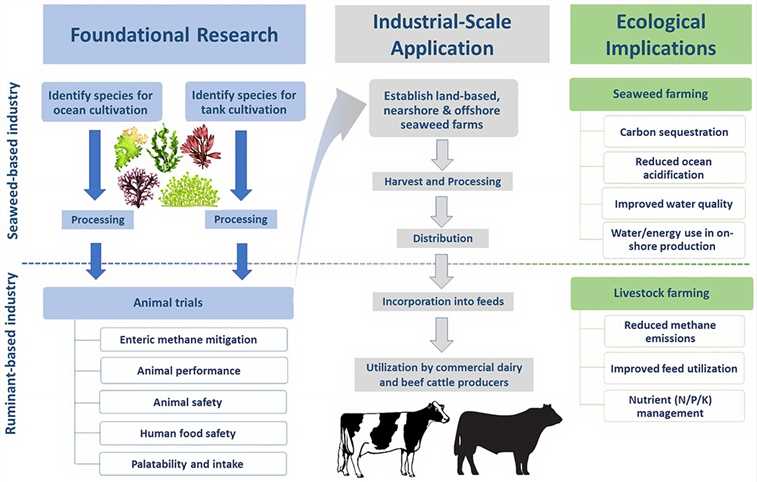Using seaweed as an animal feed supplement is not a new phenomenon. It has long been used by farmers as a valuable feed source for livestock and aquaculture. With a reported world production of 150,000 tonnes of seaweed meal per year, there is great potential for developing a food-efficient livestock industry using marine resources. Seaweeds used in animal feed can potentially improve animal performance and health. In addition, they can increase resistance to disease by ensuring a balanced intake of micronutrients. For example, mastitis and bovine fever can be reduced by consuming algae. Currently, macroalgae are fed directly or processed into seaweed meals as feed. Coastal areas are rich in seaweed and can produce and process their own into seaweed meal, while inland areas can purchase and feed processed seaweed meal directly.
 Fig 1. Proposed pathways to the development of seaweed products for enteric methane mitigation. (Vijn S, et al., 2020)
Fig 1. Proposed pathways to the development of seaweed products for enteric methane mitigation. (Vijn S, et al., 2020)
Seaweed is a high-value product as a sustainable feed ingredient in farm and aquatic animal diets. Our scientists focus on the use of seaweed and seaweed-derived products as a feed source for aquaculture animals (shrimps and fish), ruminants (small and large animals), companion animals (dog and cat) and monogastric livestock (poultry, pigs, horses, and lean animals), and analysis of the effects of seaweed addition on the growth, performance, quality, and yield of animal products.
We analyze seaweed animal feeds in the form of fresh seaweed, dried seaweed, and even seaweed crude extracts, focusing on nutritional and biochemical studies of seaweed as feed. Lifeasible is constantly developing the potential of feed production from macroalgae and is committed to providing specialist solutions for seaweed feed applications.
Animal feeds play a vital role in global food security, aiming to ensure the sustainable production of safe and affordable animal protein. Hazards from seaweed feed sources are controlled and rigorously analyzed to ensure the safety of the feed consumed by animals, primarily to assess the bioaccumulation of arsenic and lead.
We offer specialist solutions for using seaweeds as fish feed additives, including Ulva sp., Undaria sp., Ascophyllum sp., Porphyra sp., Sargassum sp., Polycavernosa sp., Gracilaria sp., and Laminaria sp. for feed formulations for fish feed. In addition, we evaluate the effects of seaweed feeds on fish growth, digestive enzyme activity, and immunity.
We offer a low percentage (0.05-4%) of various seaweeds in the feed of monogastric animals (poultry, swine, equine, and low-fat animals). We also evaluate their effects on animal health (i.e., intestinal health and immune response), improving the quality of the composition of livestock-derived products (i.e., increasing iodine content in meat) and, in time, maintaining or improving animal performance (i.e., weight gain and egg production).
Seaweed is a rich source of protein and non-protein nitrogen. We supplement ruminant feed with several protein-rich seaweeds at 10% - 40% and evaluated the animals for their potential to control rumen fermentation and methane production.
Macroalgae and seaweed extracts may have potential applications in the pet food market as a new source of protein, amino acids, and other micronutrients. We add seaweed to pet diets to increase their taurine content. In addition, we add seaweed to pet food as an emulsifier, texture modifier, and binder based on its technical, functional properties.
Lifeasible is constantly exploring the maximum potential of seaweed applications. We try to add seaweed or seaweed extracts in feed to improve the nutritional structure of the feed and increase the utilization of the feed. It also improves the quality of livestock products, animal resistance to disease and stress, animal performance and farming efficiency. We are your trusted partner in all aspects of seaweed research. If you are interested in our solutions, please do not hesitate to contact us.
Reference